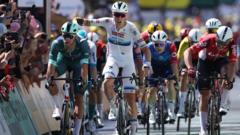Can Merlier's Sprint Victory Outshine Van der Poel's Breakaway Bid?

Tim Merlier Shines in Stage Nine of the Tour de France
The Tour de France is known for its thrilling sprints, breathtaking climbs, and relentless competition. In the latest edition of this iconic race, Belgian sprinter Tim Merlier made headlines by clinching victory in stage nine, showcasing his remarkable speed and tenacity. Riding a wave of momentum from his earlier victory in stage three, Merlier's win adds another chapter to his growing legacy in professional cycling. This article dives deep into the events of stage nine, the strategic plays that unfolded, and the implications for the overall Tour de France standings.
A Closer Look at the Stage
Stage nine spanned a distance of 174.1 kilometers, weaving through picturesque landscapes from Chinon to Chateauroux. The stage was marked by a thrilling sprint finish that had fans on the edge of their seats. Merlier's victory was not just a testament to his speed but also to the strategic maneuvering of his team and the dynamics of the race itself.
The Breakaway Attempt
The excitement began early in the stage as Dutch cycling star Mathieu van der Poel and his teammate Jonas Rickaert launched a daring breakaway. Their strategy aimed to secure a victory against the backdrop of Chateauroux, known for its sprinting history and previously dubbed 'Cavendish City' in honor of Sir Mark Cavendish's legendary performances.
- Breakaway Highlights:
- Van der Poel and Rickaert attacked early in the stage.
- They managed to create a significant gap of five minutes at one point.
- Despite their efforts, the peloton eventually reeled them in.
Van der Poel's audacity to go for an ambitious win was fueled by a personal dream shared with Rickaert, who had hoped to stand on the podium at the Tour de France. Their courageous effort showcased the spirit of competitive cycling, even when the odds were stacked against them.
Tim Merlier's Sprint Finish
As the race progressed, the peloton began to organize itself for the final stretch, with a palpable tension in the air. With about one kilometer remaining, Merlier seized the opportunity to unleash his speed. He maneuvered past Jonathan Milan and held off a fierce challenge from compatriot Arnaud de Lie to secure his second stage win of the Tour de France.
Merlier's post-race comments reflected his satisfaction: "Five minutes [to Van der Poel in the break] is a lot but we tried to chase, and the other teams started to help. The pacing was quite high at the front, but it was hard for all the guys—the bunch was nervous." This insight into the race dynamics reveals the relentless pressure riders face during such critical moments.
Implications for the General Classification
Despite the thrilling sprint finish, stage nine did not alter the overall standings at the top of the general classification. Defending champion Tadej Pogacar maintained a 54-second lead over Remco Evenepoel, with two-time winner Jonas Vingegaard in fourth place, one minute and 17 seconds adrift of the yellow jersey. However, the day's events were not without their setbacks; Pogacar's team faced a significant blow with the abandonment of key teammate Joao Almeida due to injuries sustained during stage seven.
Looking Ahead: Bastille Day Challenges
As the Tour de France continues, the next stage promises to be a test of endurance and strategy, particularly on Bastille Day. Stage ten will feature eight categorized climbs over a distance of 165.3 kilometers from Ennezat to Le Mont-Dore Puy de Sancy in the Massif Central. This stage is expected to shake up the standings, offering climbers an opportunity to make their mark.
The Future of Sprint Stages in the Tour de France
The role of flat sprint stages in the Tour de France has sparked considerable debate among cycling enthusiasts and analysts. Critics argue that such stages can become predictable, with excitement typically concentrated in the final kilometers. However, the thrilling events of stage nine serve as a reminder of the unpredictability and strategy involved in these segments of the race.
Why Sprint Stages Matter
Flat sprint stages, while often seen as less dynamic than mountainous terrains, play a crucial role in the overall structure of the Tour de France. Here are some reasons why they are essential:
- Variety: They provide a change of pace from the grueling climbs and time trials.
- Opportunity: Sprinters get their moment to shine, showcasing their speed and tactical prowess.
- Team Dynamics: These stages require teamwork and strategy, as sprinters rely heavily on their teammates for positioning and protection.
Moreover, as demonstrated in stage nine, even flat stages can produce unexpected drama and excitement, keeping fans engaged throughout the race.
Conclusion
Tim Merlier's victory in stage nine of the Tour de France exemplifies the unpredictable nature of this prestigious event. With strategic breakaways, intense sprints, and the ever-shifting landscape of the general classification, each stage brings new challenges and opportunities for riders. As the race progresses into the mountainous terrains ahead, the excitement is set to increase, promising thrilling moments for both participants and fans alike.
As we look forward to the upcoming stages, one can only wonder how the dynamics will evolve. Will sprinters continue to dominate, or will climbers rise to the occasion? The answer lies ahead in the breathtaking journey of the Tour de France.
FAQs
What is the significance of stage wins in the Tour de France?
Stage wins contribute to a rider's overall standing and reputation, showcasing their skills and potentially impacting team strategies for future stages.
How do breakaways impact the overall race strategy?
Breakaways can create tension within the peloton, forcing teams to react and potentially change their tactics, impacting the overall race outcome.
What challenges do sprinters face in the Tour de France?
Sprint stages require not just speed but also positioning, teamwork, and the ability to navigate through the crowded peloton effectively.
How does the abandonment of a key rider affect a team's chances?
The loss of a key rider can significantly hinder a team's strategy and support system, especially in mountainous stages where endurance and assistance are crucial.
As the Tour de France unfolds, it will be exciting to see how the remaining stages shape the final outcomes and which riders will emerge victorious. Will Tim Merlier continue his winning streak? Only time will tell. #TourdeFrance #Cycling #TimMerlier
Published: 2025-07-13 16:14:09 | Category: sport



